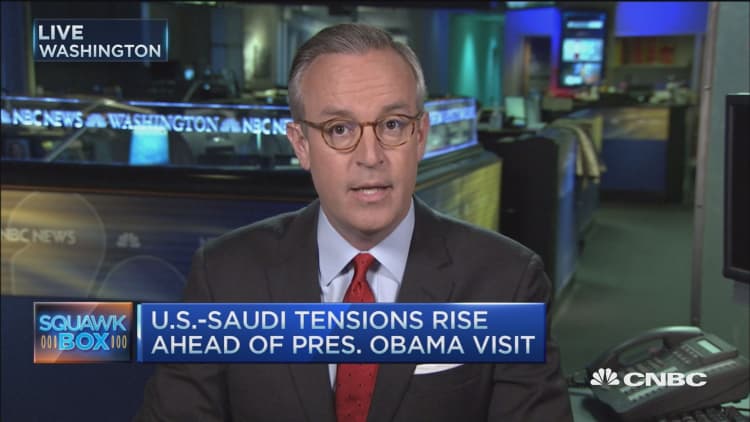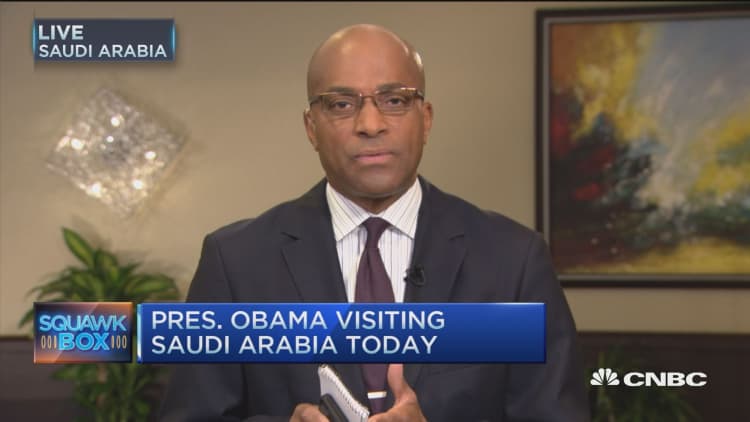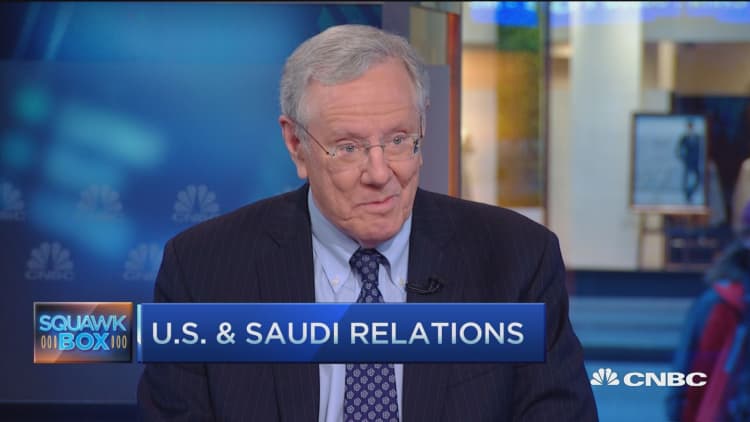


Saudi Arabia says it may sell off $750 billion in U.S. assets if a Congressional vote doesn't go its way, but experts question if the desert kingdom would carry out the threat — or if it even owns the assets.
Last month, Saudi Foreign Minister Adel al-Jubeir told the White House and lawmakers that his country could offload up to $750 billion in U.S. assets if Congress makes it possible to prosecute Saudi officials in terrorism cases in American courts, The New York Times first reported. The tough talk came before President Barack Obama arrived in the desert kingdom on Wednesday.
A bipartisan Senate bill would make it possible for overseas officials to be held responsible for attacks carried out on U.S. soil that kill Americans. Families of Sept. 11 victims are pressing for the bill.
But it's uncertain whether the threat is serious. Former U.S. Ambassador to Saudi Arabia James B. Smith told CNBC he believes it was merely a blithe comment on the part of al-Jubeir.
"I don't see it as something that is executable, or that they would be willing to execute, for the simple reason that the petroleum economy is still based on the dollar," he told CNBC.
The credibility of the threat is difficult to assess, because Saudi finances are notoriously opaque, experts said. And official data, at least, suggests the Saudis may not have immediate and ready access to $750 billion in assets.
For one, the sum is in excess of Saudi Arabia's $582 billion in official reserve assets. The Saudis have drawn down those reserves from an August 2014 peak of $746 billion as falling oil prices have crushed the country's tax base, leading to a budget deficit.
It hurts them just as much as us. With everything they are facing internally they're not someone who can afford to do something like that.Matt Beyenergy and technology strategist, Stratfor
A broad asset sell would hurt the Saudis "just as much as us," said Matt Bey, energy and technology strategist at Stratfor. "With everything they are facing internally, they're not someone who can afford to do something like that."
It would also appear that Saudi Arabia does not hold enough U.S. government bonds to underwrite its threat with Treasurys alone.
The U.S. Treasury Department does not disclose Saudi Arabia's U.S. bond holdings individually. Instead, it lumps the kingdom in with 14 other oil exporters in its reports. As of February, those countries held a combined total of $281 billion in Treasurys.
Saudi Arabia may very well account for a significant portion of that, Bey acknowledged. The kingdom has historically been more conservative in its investments than are fellow OPEC members Kuwait and the United Arab Emirates.
Regional experts speculated that the Saudis may have backed into the $750 billion figure by including a wide array of assets, some of which may not be liquid. It may encompass investments with private equity firms, hedge funds, and ETFs, for example, as well as joint ventures with U.S. businesses.
The Saudis may also be counting assets held by their state-owned enterprises and the royal family at large. That could include U.S. real estate, said Simon Henderson, director of Gulf and energy policy at the Washington Institute for Near East Policy. In that case, the Saudi leadership would essentially have to convince wealthy citizens and royals to divest those assets.
Henderson cautioned that with little transparency into Saudi finances, analysts are operating in a gray area. But the development is nevertheless significant, because it suggests the Saudis are firing back at the White House's criticisms of the kingdom amid a deteriorating relationship between the long-time allies.
"It's a response to those public statements, and we're heading for a diplomatic train wreck," he said.
Saudi Arabia's Al-Jubeir said any sale of U.S. assets would be necessary in order to prevent them from being frozen during a lengthy court battle, according to the Times.
Ambassador Smith said that while the threat is likely empty, it could allow the Saudis an opportunity to kill two birds with one stone: address long-standing criticisms of its ultra-conservative, low-yielding investment policy, and allow the leadership to be seen standing up to the United States.
"I can see a scenario where they might sell off some of their Treasurys in order to fund a different investment strategy with a higher rate of return and, in the process, say that what they're doing is a punitive action against the United States," he said.
There are already signs of a shift. Deputy Crown Prince Mohammed Bin Salman told Bloomberg he aims to transform the kingdom's Public Investment Fund from a $100 billion stakeholder in domestic companies into a $2 trillion investment vehicle.




